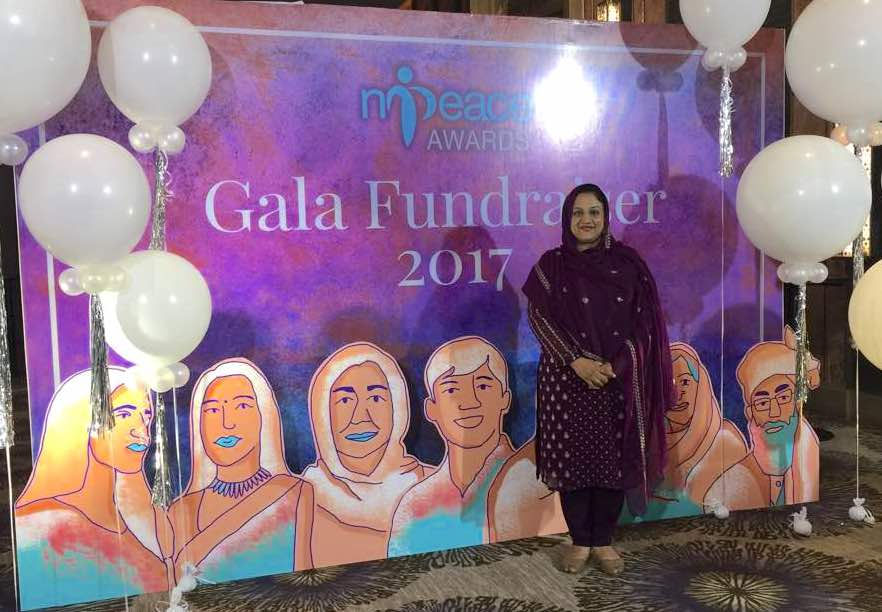Approaching Peace Through Informed Dialogue: Interview with Farhat Asif
- Zunera Rais, Pakistan Country Coordinator
- Apr 12, 2018
- 6 min read

A Kashmir-born Pakistani woman, Ms. Farhat Asif is the founder of Institute of Peace and Diplomatic Studies, a leading research think-tank in Pakistan. She is also the Co-founder of Pakistan’s first multilingual monthly Magazine, The Diplomatic Insight which focuses on Peace Through Informed Dialogue. An academic, researcher and activist, she is a recipient of the N-Peace award, 2017 in the “Campaign for Action” category in recognition of her tireless efforts to bring forward women activists to all forms of peace processes.
Let me begin by offering heart-felt felicitations on your great achievement of N-Peace award. How does it feel to be recognized for your efforts?
When I was asked to approach the podium for the N-peace award, it was a magical feeling. It was magical, because we continue to contribute in various fashions, but there comes a point where you realize that a little acknowledgment is necessary. Although you stand alone on the stage but in essence you are accompanied by a lot of people, like your family, your co-workers and other supporters of your work. It is difficult to achieve anything alone. I have been a firm believer of this and have extensive experience of working with a variety of networks. When you are standing on that stage, a lot of people come to mind and the achievement is both yours and theirs. We are like a family, and everyone has their own space and assignments. And over the long run you get recognition and acknowledgement, but it’s just a step, because it leads to added responsibilities and expectations.
I have worked with a lot of organizations and individuals but the most fun I have had is working with the Women’s Regional Network. They forwarded my nomination for the award and supported me for it.
This, in a way, is an epitome of your achievements. Please explain the efforts that you undertook along the way as an activist and development professional.
After my Masters an M.Phil from Quaid-i-Azam University , I joined a research think-tank in Islamabad. After two years I quit, and along with my husband started publishing The Diplomatic Insight, a magazine with thematic objective of Peace Through Informed Dialogue. The purpose was to bridge gaps between Pakistan and the rest of the world. We used the soft advocacy approach to bring forth the positive image of Pakistan. This year will mark the 10th anniversary of the magazine. The magazine is a public diplomacy initiative and we organize policy dialogues, seminars. conferences to discuss about the issues of regional and international peace and security.
While I was publishing, I had a chance to visit the US for three weeks along with 11 other women. There, we met with congressmen and congresswomen in different states and discussed with them insights from Pakistan’s perspective, especially we discussed Pakistan’s stand on war of terror, and we found that our audience was quite receptive. One of the highlights of the tour was our meeting with Secretary of the State, Hillary Clinton.
In 2013, I founded the Institute of Peace and Diplomatic Studies (IPD). Our founding stone was laid by Professor Johan Galtung, founder of the Galtung Institute for Peace Theory and Peace Practice. This was our initiative to set-up a research and advocacy think tank for promotion of peace, conflict, sustainable development and diplomatic studies. IPD is an independent, non-governmental and non-profit think tank that aims to provide strength to global peace through dialogue and diplomacy by sharing knowledge, research, analysis and policy development in thematic areas. We have organized dialogues, seminars, conferences, launched outreach activities through my institute and because of our large network and diplomatic community, we encouraged women involvement and essentially promoted feminism at global platforms. This lead me to initiate the Emerging Women Leader Congress in 2013. The program was inaugurated by Tawakkol Karman (Nobel Peace Laureate, 2011). Since the ultimate plan of our institute is to become a higher education university, we asked her to establish the Center for Women Peace and Security, which later became Center for Women Peace and Leadership. Additionally, the congress is an ongoing effort, where we are especially focusing on young women who have taken some sort of initiatives at their local level.
Another initiative that comes from my origin as a Kashmiri woman was Samanbal. It is a platform launched to establish communications between the Kashmiri people across the border. Because of years of separation, it is very hard to understand the conditions and atmosphere of Kashmiris on opposite side of the border. The platform allows the people on either side to re-establish the lost bonds. The idea was borrowed by a similar initiative launched by women in India to connect with their sisters in Kashmir. I realized that women in general but also Kashmiri women need to have a say in the peace processes and dialogues especially related to women peace and security matters.
"Another initiative that comes from my origin as a Kashmiri woman was Samanbal. It is a platform launched to establish communications between the Kashmiri people across the border. Because of years of separation, it is hard to understand the conditions and atmosphere of Kashmiris on opposite sides of the border."
In your opinion, besides WRN, what is needed to stimulate substantial efforts involving women at the regional level?
WRN is a great regional initiative and it has done much work to document the voices of rarely heard women along the Line of Control (LoC) in remote and isolated parts of the Indian side of Kashmir. However, complimentary work should be done on the Pakistani side in the upcoming community conversations.
Additionally, there is a strong need to have training of women from the region to be leaders and torch bearers for our future generations to develop peace and build the synergies amongst the communities. We need to gather our forces and join hands across region to find and help the young ones to lead the way for a better tomorrow.
You have previously expressed the opinion that men need to be a part of the movement to enable the women and they must generate equal efforts in taking initiatives to bring concerns of women to light. In your opinion, will they be able to show the right level of sensitivity towards the issues?
I believe it is impractical for women to run the show single-handedly. We need allies, especially since it is a society led by men, and there is no benefit in creating supplementary gender-based disputes. A balanced relation is the key to launch smart and successful initiatives.
"To women, I will ask them to give up excuses and step-out of their comfort zones. Women have all the potential and ability to be agents of change and transform societies for the better. Women should take up any opportunity to raise their voice and utilize any means and resources to go forward in life and realize their full potential."
As you know there exists a huge divide, especially when it comes to women in the rural areas. So, what would be the ideal catalyst to bridge this gap?
One step could be that the women in parliament should reach out to these women to show solidarity and support for bridging the divide. This can be a woman-lead initiative. Although Government and state are doing their part but there is a strong need for education and empowerment of the women in these regions. Our congress initiative strives to provide a platform to connect young emerging women leaders with the seasoned ones, to connect and develop projects and initiatives for the welfare of the communities. In my opinion, innovation is the key to lead Pakistan out of the outdated norms and approaches.
What is your parting message?
To women, I will ask them to give up excuses and step-out of their comfort zones. Women have all the potential and ability to be agents of change and transform societies for the better. Women should take up any opportunity to raise their voice and utilize any means and resources to go forward in life and realize their full potential. Along the way, it would be pragmatic to not generate additional conflicts, as we have to face a lot of challenges in a biased atmosphere where patriarchal practices are still commonplace. We need to be educated and lead our way forward.
Like this story? Have something to share? Write to us at wrnoffice@womensregionalnetwork.org or connect with us on Facebook and Twitter.
Recent Posts
See AllIn Quetta, Pakistan, young Hazara women are exhibiting unprecedented strength and resilience in the face of violent extremism. Jalila...































Comentarios